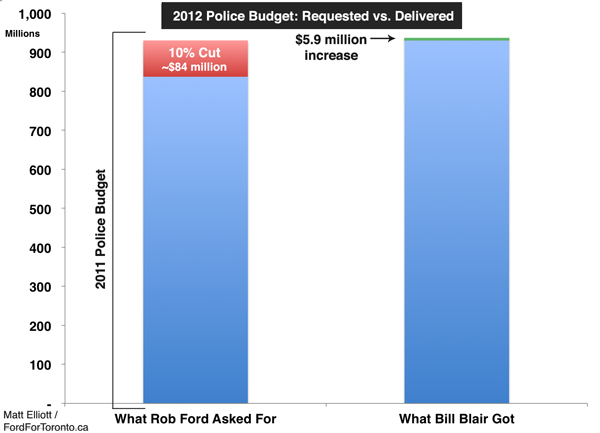I generally try to stay away from the sideshow parts of this mayoralty and focus on policy and council dynamics, but, hell, no blog that purports to cover the day-to-day at Rob Ford’s City Hall would be complete without a mention of this. So here goes.
Rob Ford called 911 three times because there was a sketch comedian and camera crew in his driveway. This was widely regarded as a bad idea.
I thought Ed Keenan at The Grid and Ivor Tossell at The Toronto Standard had great takes on the calls, the fall-out, and all the twists and turns, including the bit where CBC reported that the mayor, over the course of his calls, said something along the lines of “You bitches, don’t you know who I am? I’m Rob Fucking Ford. The mayor of this city.” And then the part where Police Chief Bill Blair came to the mayor’s public defence, assuring us that he had hard the call, and that there was no use of the word “bitches.”
Looking back, the goal posts sure moved a lot over those five days. The mayor started the week thinking he’d get to celebrate a council victory with the contracting out of garbage collection west of Yonge. He ended it by finding vindication in the police chief’s confirmation that he did not, in fact, call a woman a bitch. (Though, admittedly, he did use a bit of profanity with her.)
There was some sputtering from would-be defenders of the mayor. They said this whole incident was because employees at the Toronto Police Service are biased against Rob Ford. They expressed great moral outrage that someone would approach a politician on their driveway in an attempt to get an interview. They suddenly had grave concerns about the length of time 911 takes to respond to calls. They did that thing where they referred to CBC and “my tax dollars” and flew into a rage.
And in all that, there were good points (a public figure’s right to privacy; 911 response times) and bad ones (any notion that bias against Ford played a role in this) but I just can’t get beyond this: if the mayor had just spent two minutes talking to the woman with the camera crew, giving her a few token comments, none of this would have happened. If he had, instead, retreated to his house, waited for the crew to leave, and then gone about his day, none of this would have happened.
In all the alternate-universe takes on this chain of events, the only one that comes out worse for the mayor is the one where he backs over Marg Delahunty with his mini-van.
Why this never mattered
The narrative of Rob Ford’s dwindling public support goes like this: a lot of people bought into the notion that there was a ton of waste at City Hall and Rob Ford was the guy to fight it. Once that story got bulldozed under the plodding reality of consultants and slow-burn service cuts, they started jumping ship. Hence, he’s the second most unpopular mayor of a major city in Canada.
An incident like this is never really going to move the needle. Either you’re a voter who has shown themselves willing to look beyond the mayor’s quirks of character — if it’s fair to call getting drunk at a hockey game and telling a woman she should get raped and shot ‘quirky’ — and support Rob Ford, or you’re not. The CBC’s original account of the situation — the one with the “bitches” — spread so far and so fast not just because it was salacious (and funny) but because it was believable. It fit the established Rob Ford we know.
The CBC’s screw-up
Much has been made of the CBC running with this story despite apparently having not heard the 911 tapes. Today at Torontoist, Mark Bourrie argues that the whole incident reflects so badly on the public broadcaster that it could contribute to a future push to reduce or eliminate funding. I think that might be overstating things.
But the CBC definitely made a mistake here, and I think it comes down to running unconfirmed quotes from the supposed 911 calls. I’m not sure who made that call, but it was the wrong one. Had CBC led off with a news story that reported only that the mayor had made repeated 911 calls, used profanity, and been rude toward the operators, that likely would have held up to scrutiny and still driven the page views.

